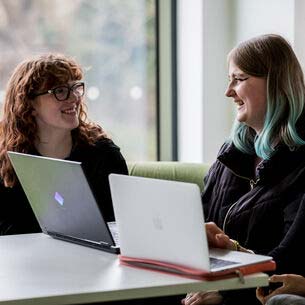Contextual offers
Details of what our contextual offers involve, who's eligible, the application and support available.
UWE Bristol is committed to ensuring all students are able to fulfil their potential. We strive to make our community welcoming, caring and supportive. We support students from all backgrounds and look to understand applicant's individual circumstances when making an offer of a place to study.
We use information from your UCAS application to consider your background and experiences as an individual and the impact these may have had on you and your qualifications. Using this information, we look to provide a contextual offer.
For any questions about contextual offers, please email the Admissions team at admissions@uwe.ac.uk.


Read Chantelle's blog"When I applied to UWE Bristol, they contacted me to say they wanted to offer me a contextual offer. UWE Bristol gave me a chance when I didn’t think university was an option for me."

Chantelle Criminology and Law student and contextual offer holder
When I applied to UWE Bristol, they contacted me to say they wanted to offer me a contextual offer. UWE Bristol gave me a chance when I didn’t think university was an option for me.
Read Chantelle's blogOur contextual offer
UWE Bristol’s contextual offer is a tariff reduction of 16 UCAS tariff points for all undergraduate degree courses and eight tariff points for all foundation year courses below the standard entry tariff. This is applicable to home applicants only.
Further tariff information is available on our course pages.
Who's eligible for a contextual offer
We'll use the multiple equality measure (MEM), which is UCAS' principal measure of equality. It brings together information on several equality dimensions for which large differences in the probability of progression into higher education exist.
These dimensions include:
- Sex
- Ethnic group
- Where you live (using the Participation of Local Areas (POLAR4) and Indices of multiple deprivation (IMD) classifications)
- School type
- Income background (as measured by whether a person was in receipt of free school meals (FSM) at age 15, a means-tested benefit while at school)
- Income deprivation affecting children index (IDACI).
We'll also use UCAS’s widening access questions: in the 'More about you' section of the UCAS application form:
- Do you have any caring responsibilities?
- Are you a parent or do you have any parenting responsibilities?
- Do you have official refugee status in the UK?
- Would you consider yourself estranged from your parents?
- Do you have a parent or carer that currently serves in the UK armed forces, or has done so in the past?
- Have you ever served in the UK armed forces?
- Are you currently receiving free school meals, or have you ever been in receipt of free school meals during your secondary education?
- Would you consider yourself as living with any of the following? (dropdown selection provided)
- A learning difference (such as dyslexia, dyspraxia or AD(H)D)
- A visual impairment uncorrected by glasses (such as blindness or partial sight)
- A hearing impairment (such as D/deafness or partial hearing)
- A physical impairment or challenges with mobility (such as climbing stairs or uneven surfaces), or dexterity (such as using a keyboard or laboratory equipment)
- A mental health condition, challenge or disorder (such as anxiety or depression)
- A social, behavioural or communication impairment (such as an autistic spectrum condition (including Asperger's syndrome) or Tourette's syndrome)
- A long-term illness or health condition which may involve pain or cause fatigue, loss of concentration or breathing difficulties – including any effects from taking associated medication.
- A condition or impairment not listed above.
Applying for a contextual offer
Apply in the usual way through UCAS and we will be in touch if we are able to provide you with a contextual offer.
Please note you will find the widening access questions in the 'More about you' section of the UCAS application form.
In the ‘More about you’ section of UCAS’s application form, their widening access questions are optional. However, we recommend you provide as much detail as you’re comfortable sharing about your personal circumstances and background.
This is because the answers you provide will help us to understand your situation so we can best support you. Don’t worry, sharing this information won’t affect your application to study at UWE Bristol.
Access to UWE Bristol support programme
All contextual offer holders will be invited to join our Access to UWE Bristol support programme, which aims to support students through the transition from school or college to university life. You will have access to our:
- preparing for higher education talks – these are delivered by the Widening Access team at Offer Holder Events.
- webinar series – delivered by the Widening Access team with input from Access to UWE Bristol alumni.
- mailing list – you will receive helpful updates and resources via email.
- Summer School – a three-day event on Frenchay Campus where you’ll learn to adjust to student life before starting your course.
Summer Schools
When you join the Access to UWE Bristol support programme, you’ll be invited to attend a three-day summer school to help you to adjust to university-level study.
At your summer school, you’ll:
- take part in many useful and fun activities, from library, money and support information sessions to campus scavenger hunts, badminton and climbing.
- get the opportunity to meet other contextual offer holders, giving you a chance to make friends with likeminded people before you start university.
- even stay in our student accommodation on Frenchay Campus, to give you a real feel of what it’s like to be a UWE Bristol student.
- gain the skills and confidence to adapt to your studies, manage your finances and navigate student life, giving you the best chance of success at university.

Read Brad's blog post"I was worried about falling behind in my studies, but the Summer School really helped my anxiety with this. After the Summer School, the transition to university was easier than I thought it would be."

Brad Cyber Security and Digital Forensics student and contextual offer holder
I was worried about falling behind in my studies, but the Summer School really helped my anxiety with this. After the Summer School, the transition to university was easier than I thought it would be.
Read Brad's blogYou may also be interested in

Funding and scholarships
Funding and scholarships information for new students, including advice on undergraduate and postgraduate funding and financial support from UWE Bristol.

Sign up for email updates
Register your details and receive helpful tips about applying to and studying at UWE Bristol and hear about upcoming events.

Ask a student
Ask a current student questions about their course, what it's like to study with us, or life in Bristol.

Health and wellbeing
Health and wellbeing services for students at the University.
